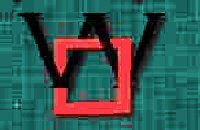 Analyses of all verses
Analyses of all verses
|
 Web Site
Web Site |
 All
Sefirots All
Sefirots |
Nostradamus C8 Q77: Battles of religion
during the era of climate change and genetic manipulation.
Copyright: Allan Webber, December 2015, 2022

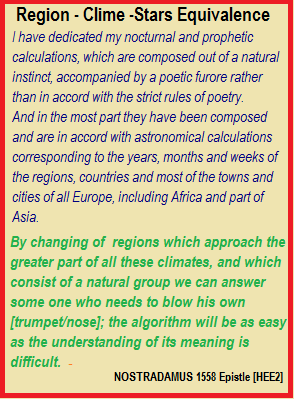 The
future tense used in the text of C8 Q77 makes it clear that it is
about a religious war in a time well beyond 1558CE.
The
future tense used in the text of C8 Q77 makes it clear that it is
about a religious war in a time well beyond 1558CE.
Then the anagrams make it apparent through the names, Constantine(en toſt annic) and Gregories(rogie greſ), that the focus of the war is based on the issues debated at the Nicaean Council of the 4th century.
One of the critical issues at that Council was the begotten / unbegotten status of Christ. It was as part of the resolution offered to that quest that the concept of the Holy Trinity became entrenched in the Christian Church.
Through the above aspects, C8 Q77 is seen to be a strong contributor to my series arising out of links to the quote from Nostradamus 1558 Epistle; the one about the begotten / un-begotten status of Christ.
But it is as equally tied to another quote in the epistle; that which presents the stories of the three brothers and other members of the 'once-barren Lady' family. That story line is the culmination of the status of Christ, for its narrative is the manipulation of genes using 'DNA from Christ relics and blood line' to produce clones of Christ.
It is because of the Christ status story stream, that I paired it with C3 Q59 in order to form the trunk of the climate verse trail; this paired verse contains some of the most powerful religious terminologies to be found in any part of religious literature and was part of an earlier series based on the Christ status theme. Yet that strong referencing is part of Nostradamus' thoughts, not a religious treatise.
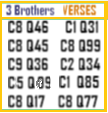 The
verse with which C8 Q77 is paired in the three brothers series differs
again; its pair is C8Q17 and I did this because both verses cover more of
the background details. They convy insight the specific fervour of religious
nature that
determines mankind's destiny.
The
verse with which C8 Q77 is paired in the three brothers series differs
again; its pair is C8Q17 and I did this because both verses cover more of
the background details. They convy insight the specific fervour of religious
nature that
determines mankind's destiny.
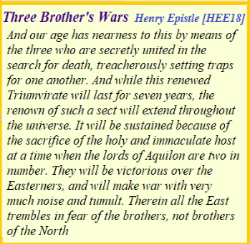 These
unenlightening religious frameworks can be seen as the under-pinning
mechanism uniting the verses with strongest links to the
description in the 1558 Epistle quote shown above left.
These
unenlightening religious frameworks can be seen as the under-pinning
mechanism uniting the verses with strongest links to the
description in the 1558 Epistle quote shown above left.
However the other quote to which this verse is linked is as equally compelling and that quote about the three brothers is shown alongside.
The text of the current verse says the antichrist annihilates the three but doesn't include the word brothers. Yet its story line sits within the framework of the tale in the above quote and other verses, where the three brothers are more clearly referenced.
There are other anagrams in the current verse that unify the streams that merge late in this and early in the next century.
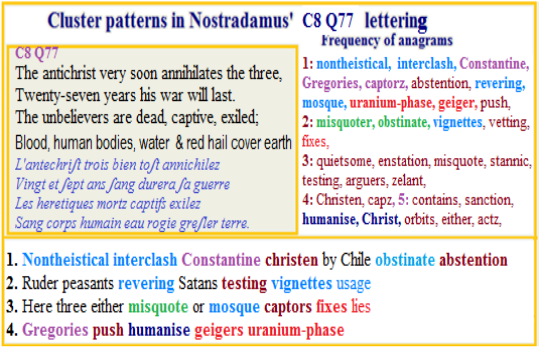
The text and anagrams therefore lead to a trail that focuses on the religious differences arising from decisions about heresy made at the Nicene Council.
The concepts shared in this pair of verses meshes with other concepts produced in this series. These help define the end of this century as the period in which the religious war over Jesus genetic legacy will be fought.
That period corresponds with the first of the Christ based clones reaching the age that he could take religious and military leadership.
It is here in this verse that Nostradamus makes it clear that the future holds a great war in which opposing views of the Christian church are engaged.
His text indicates that it is those with belief in an active God that are the instigators of the war which is started in order to commit genocide on those who have different views.
This interpretation of the current verse also provides the header for the trail telling the story of the Antichrist wars.
Key Ideas:
nontheistical, uranium-phase, processranger, Constantine, hermetiques, abstention, interclash, Gregories, captorz, revering, mosque, geiger, push, misquoter, obstinate, vignettes, setting, vetting, fixes, quietsome, enstation, misquote, stannic, testing, setting, arguers, zelant, Christen, capz, contains / sanction, humanise, Christ, orbits, either, actz, peasants, notates, thrice, saga, Chile, river, requites, patents, richest, quieter, given, Benoist, trench, mouse, zeal, nations, three, riches, exiles, liez, aptness, chanter, cog, argues, Lexis, Satans, giro, lancet, reargue, grandeur, Septet, Durer, crops, here.